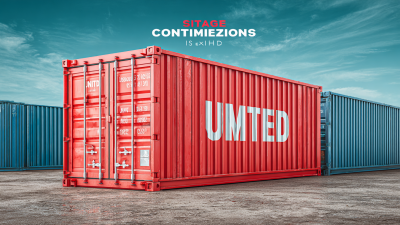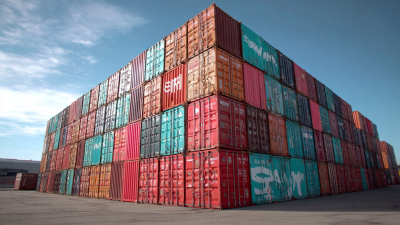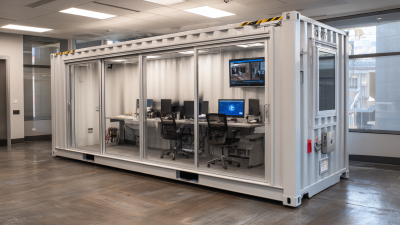In today's fast-paced business environment, the efficiency of operations is paramount, and choosing the right Roll Off Storage Containers can significantly impact a company's logistical capabilities. According to a report by the Self Storage Association, the self-storage industry is projected to grow by 5% annually, with businesses increasingly turning to roll-off containers for their versatile and space-saving features. These containers not only provide a temporary solution for excess inventory but also enhance site organization and safety. Furthermore, a study by the Containerization and Intermodal Institute reveals that businesses utilizing roll-off containers experience a 15% increase in operational efficiency. Therefore, understanding the essential factors to consider when selecting these storage solutions is crucial for any business looking to optimize its storage and operational strategies.

When selecting roll-off storage containers for your business, several key factors can significantly influence your decision. First and foremost, consider the size and capacity of the containers. According to a report by the Container Leasing Association, the standard sizes range from 10 to 40 cubic yards. Assessing your space requirements can help ensure that you choose a container that meets your project needs without incurring unnecessary costs.

Another critical aspect is the materials and durability of the containers. Roll-off containers are often exposed to harsh outdoor conditions, so ensuring they are made from high-quality steel or other resilient materials is vital. The National Waste & Recycling Association notes that using well-constructed containers can reduce maintenance costs by 20-30%. Therefore, it pays to invest in a sturdy and reliable solution.
Tip: Always evaluate the service provider’s reputation and customer service. Look for a company that offers transparent pricing and flexible rental agreements. Additionally, inquire about their delivery and pick-up schedules to avoid potential delays that can impact your operations.
When choosing the right roll-off storage containers for your business, it's crucial to understand the various sizes and capacities available to meet your specific needs. Businesses often find themselves in need of varying container sizes depending on the type and volume of materials they need to store. For instance, small containers may suffice for less bulky items, while larger containers can accommodate significant waste or storage from industrial operations. According to industry reports, the roll-off container market is continuously evolving, with a significant increase in usage as businesses seek efficient storage solutions.
**Tip:** When selecting a container, consider conducting an inventory assessment to understand volume requirements. This helps prevent overpaying for capacity that won't be utilized.
Moreover, paying attention to the specifications of the containers is essential. For example, a 20-yard container is typically used for home renovation projects, while 30-yard or 40-yard containers may be better suited for commercial construction sites. Understanding these differences ensures that businesses can optimize their storage needs effectively.
**Tip:** Always consult with a storage provider to discuss your particular requirements; they can recommend the most appropriate container size for your specific project, preventing costly mistakes.
| Container Size | Dimensions (ft) | Capacity (Cubic Yards) | Weight Limit (lbs) | Ideal Use |
|---|---|---|---|---|
| 10 Yard | 12 x 8 x 4 | 10 | 2,000 | Small Renovations |
| 20 Yard | 22 x 8 x 4.5 | 20 | 4,000 | Medium Construction Projects |
| 30 Yard | 22 x 8 x 6 | 30 | 6,000 | Large Renovations and Cleanouts |
| 40 Yard | 22 x 8 x 8 | 40 | 8,000 | Commercial Projects and Construction |
When selecting roll off storage containers for your business, evaluating the durability and quality of materials is paramount. Containers made from robust materials can withstand harsh environments and heavy loads, ensuring the protection of your stored items. Recent studies show that businesses using high-quality storage solutions experience a 30% decrease in damage costs due to improved durability. This is crucial when considering long-term investment and maintenance expenses.
Furthermore, similar to the critical evaluations of various storage solutions, the choice of roll off containers should be informed by rigorous comparisons of their mechanical properties. For instance, assessing features such as resistance to rust, UV damage, and structural integrity can significantly impact the effectiveness of your storage strategy. Just as the best organizational systems provide seamless access and usability, choosing containers with high-quality materials ensures they are not only durable but also easy to operate, enhancing productivity in your operations.
When selecting roll-off storage containers for your business, it is crucial to understand the pricing structures and potential hidden costs associated with your choice. Many companies advertise attractive base rates, which can be misleading without a thorough examination of what is included in the initial quote. Always ask for a detailed breakdown of the pricing so you can identify components such as delivery fees, pickup charges, and any costs for extended rental periods.

Additionally, be mindful of extra expenses that might arise during the rental period. For instance, some providers may charge for exceeding weight limits or accepting certain types of waste. It’s wise to inquire about these potential charges upfront, as they can significantly impact your overall budget. Also, consider any costs related to damages or cleaning fees that might not be apparent at first glance. By proactively seeking clarity on pricing structures and hidden fees, you can ensure that you choose the right roll-off storage container that aligns with both your operational needs and financial constraints.
When choosing roll-off storage containers for your business, compliance with local fire safety regulations is paramount, especially in densely populated areas such as small blocks. According to the National Fire Protection Association (NFPA), improper storage can lead to significant fire hazards, potentially jeopardizing both life and property. Local regulations often dictate the placement of storage containers, ensuring they do not obstruct emergency access routes and maintain adequate distances from other structures.
Furthermore, the International Fire Code outlines specific requirements regarding the materials stored in these containers. For instance, hazardous materials must be stored in compliant containers with appropriate labeling and access controls. A report from the Fire Safety Research Institute indicates that proper adherence to these regulations can reduce the likelihood of fire incidents by up to 25%. This compliance not only protects your investment but also demonstrates your commitment to safety and responsibility within your community. As businesses continue to expand their operations, understanding these regulations will be critical in mitigating risks associated with improper storage and ensuring the safety of all stakeholders involved.
This chart illustrates the key factors businesses need to consider when selecting roll-off storage containers, comparing the importance of different criteria based on survey data from various industries.






Rob was always very honest and upfront about everything and took the time to explain everything I needed.
“highly recommended. They provided us with a great storage container with ontime services.”
“Bought a used container, its perfect, no leaks and in good condition.”
“Good service and prompt delivery. A great option for temporary storage at a decent price.”
Join our mailing list to get the latest storage container inventory and offers